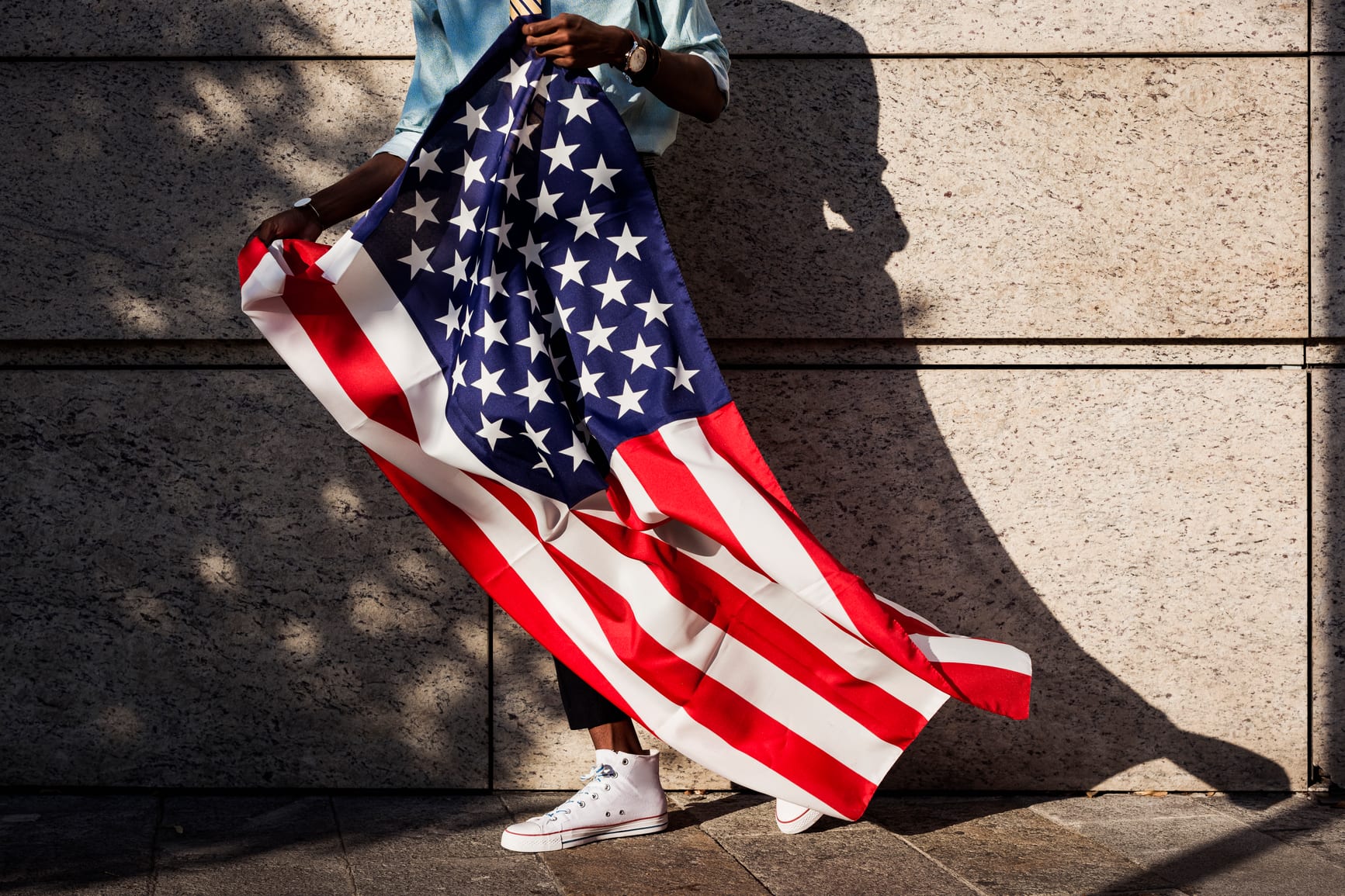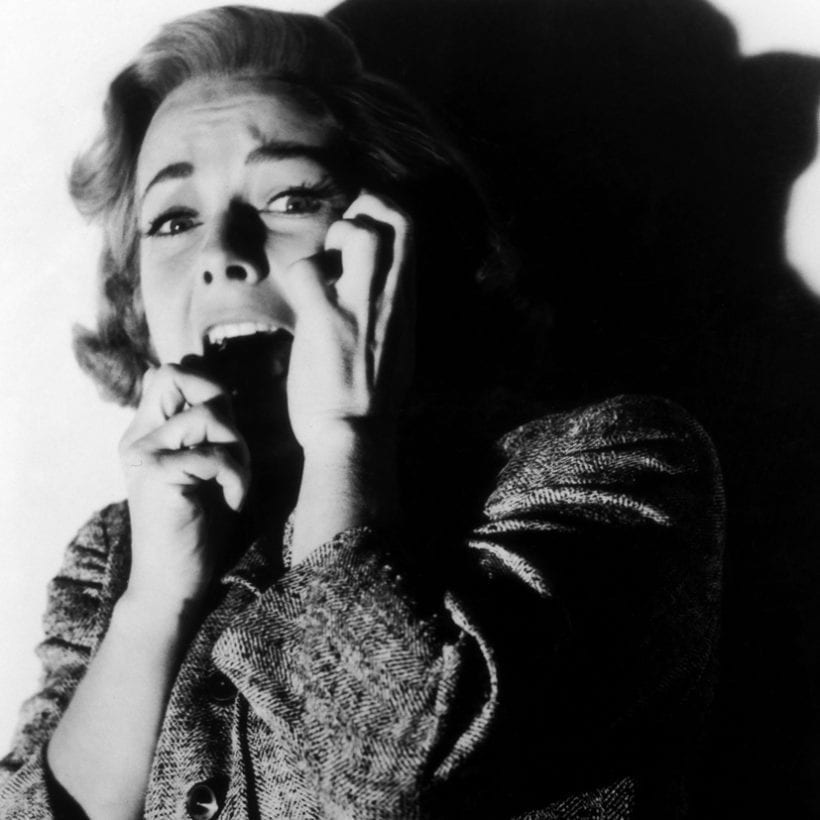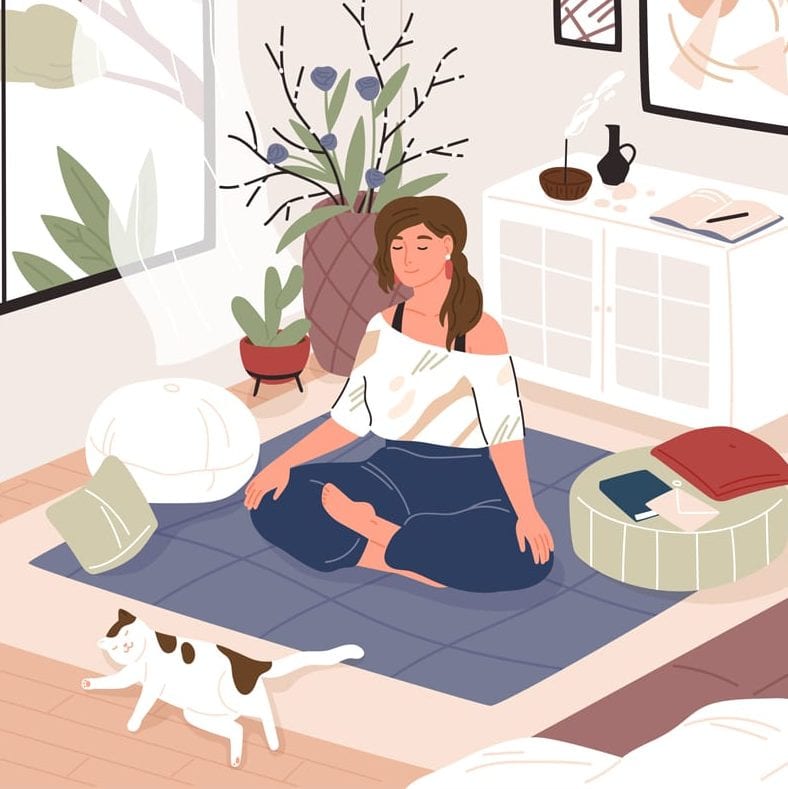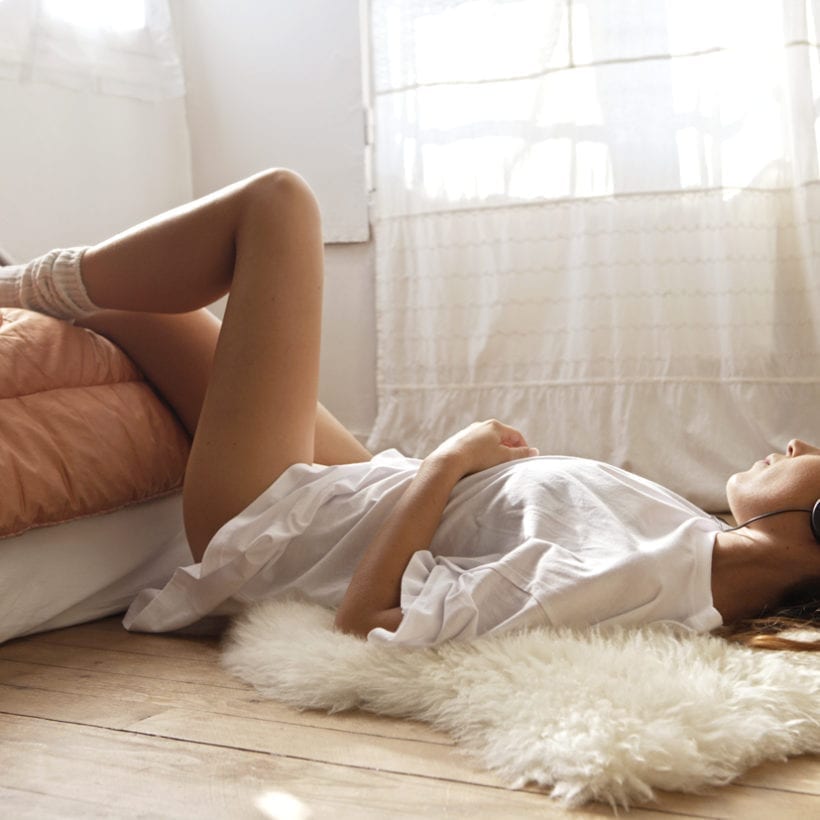If your stomach feels like it’s constantly in knots, or you’re not sleeping well these days, you’re definitely not alone. 40 million adults in the U.S. population are affected by anxiety disorders, according to statistics from the Anxiety and Depression Association of America; to put that number into context, 40 million is roughly the same as the populations of California and Wyoming combined. And even if you don’t have a diagnosed anxiety disorder, between the fraught upcoming election and quarantine burnout, you may feel constantly saturated with (bad) news, which will take a toll on anyone’s mood.
I spoke with experts about what we can do to be kind to ourselves, our loved ones, (and our skin). And while a warm bath or an adaptogenic drink are no replacement for therapy, here I’ve also rounded up some products that may help you feel just a little bit calmer when everything feels out of control (and no, none of the products are wine).
The Election & Mental Health
“Information is essential, but becoming overly saturated by content makes it more challenging for anyone to prioritize items by importance,” Eric Patterson, LPC, tells me. In fact, a recent study showed that 54% of Americans say that they want to stay informed about the news but following it causes them stress, and this study was done in 2019, which feels halcyon compared to what we’re currently living through.
“Finding the balance between staying informed but not obsessing over the news is possible. It’s much more difficult now, though, due to the unique combination of the candidates, the recent events, and the availability of technology to receive an endless supply of information,” Patterson adds.
https://www.instagram.com/p/CGnKBkoFOwr/
I find myself refreshing Twitter at an alarming rate these days. The last thing I do before I go to bed each night is scroll, which is bad and I know it is, but at the moment where I reach for my phone, it always feels like a good idea, a little dopamine rush. Sometimes Twitter makes me laugh or feel informed on the minutiae of the day, but more often it gives me a weighty sense of dread.
Patterson uses the metaphor of dehydration to explain to me what it can mean to be oversaturated with the news. “By the time a person begins to feel the unwanted effects, it’s already too late. People will notice the signs and symptoms of too much news exposure including poor sleep, irritability, anxiety, restlessness, racing thoughts, panic attacks, hopelessness, weight loss, and conflictual relationships,” he says.
When it feels like information or highlights from other people’s lives are coming at you constantly, it can be helpful to remember that you get to choose what you consume
The good news is that you don’t need to log out of Twitter or delete your Instagram entirely (unless you want to). “There’s no need to go cold turkey and give up news forever. Instead, people should start with scheduled breaks of 30 minutes where they set their phone down and leave it down. Add more breaks each day to gradually shift towards a happier balance in life,” Patterson says.
I’ve been trying this strategy myself recently by going for walks without my phone, and while it first felt weird and anxiety-producing (What if I got lost? What if I fell?) I now relish that time outdoors without checking my email every five minutes.
When it feels like information or highlights from other people’s lives are coming at you constantly, it can be helpful to remember that you get to choose what you consume. “You can choose where you get your news, decide to focus on local news only or what kinds of content you expose yourself to. When you find yourself spending more time scrolling or watching the news than focusing on other parts of your life, it’s time to turn your devices off. You can also tell your friends and family what to not send to you or talk about when you are around,” says Phebe Brako-Owusu, Licensed Marriage and Family Therapist.
The Election & Relationships
Last week, my husband, who I’ve been no more than twenty feet from for the majority of the past 9 months, ate the last piece of pizza, the one I’d been saving for lunch. And I… cried, as one does. I am anxious about what may happen on November 3rd, and then I’m anxious about feeling anxious (it’s called meta-anxiety), and I can see this playing out in how I deal with those closest to me.
“Considering the fact that there are different things at stake for different classes and groups of people, people who identify as women for example will have different reactions, like fear, [when considering] how the results of the elections will impact their lives,” Brako-Owusu says. She adds that sharing our fears with our loved ones can help provide further clarification about what our specific concerns about the future are. “They may seem unrealistic or uncalled for to some, but our fears are our own,” she says. “To explain our emotions, such as discomfort, we have to be able to first identify and name the emotions. Doing this allows for a clearer picture and explanation of what’s going on internally.”

So instead of tearing up over the last slice of pizza (which sucked, but not water-works level), I could have calmly explained to my husband that I’m feeling a lot these days: sadness and anger about the migrant children who have been forcibly separated from their parents, anger that our president did not condemn white supremacy when given the opportunity to do so, fear that reproductive rights will be taken away. It’s a lot to hold.
And on the flip side, “a partner can be supportive by asking what their partner needs and working to meet those needs. Another way to show support is to do your own research on the concerns your partner has about the elections and their outcome,” Brako-Owusu. This may spark important conversations that can help you feel understood and perhaps reassured.
How You Use Self-Care To Feel Better In The Moment
I’ve definitely reached for a glass of wine more often this year, and apparently, I’m not alone: the frequency of alcohol consumption increased by about 14% from 2019, according to a recent study from Jama. I watch every debate with a glass (or two and a half) of Malbec. I wanted to find ways to destress that did not hold the potential for hangovers and puffy eyes, so I did some research and asked estheticians how they’re unwinding with zero-ABV these days.
- “When I’m feeling stressed I tend to grind and or clench my teeth which creates tension. Using a vibrating bar along the jawline helps to massage and ease soreness, and reminds me to take a deep breath and unclench my mouth. It also has the added benefit of helping to depuff the skin by promoting lymphatic drainage and blood circulation,” Lindsay Malachowski, Esthetician and Director of Operations at Skinney tells me.
- I’ve been taking Equilibria CBD for the past month to help control my stress. The trio of CBD products (sourced from a pesticide and herbicide-free farm in Colorado) includes soft gels, a tincture, and a topical relief balm. It’s currently the only brand to give customers access to a “dosage specialist,” a real person who will help you tweak your routine so it works best for you and your schedule. After talking it over with my specialist, I now take a soft gel cap, which contains 10 milligrams of CBD each morning with breakfast (CBD is most effective when taken with a healthy fat like eggs cooked in olive oil) then later in the day around the afternoon slump time, I’ll take half a tincture dropper under my tongue. If I’m feeling particularly stressed, I’ll take another dropper later. “The key is to make sure you hold it under your tongue for as long as possible. The less you swallow the better,” Maia Reed, the head of member success at Equilibria tells me.
- If you’re unsure about CBD but still want calming effects, you could try a Joyà herbal supplement, like their Bliss Cacao Elixir Blend, which is vegan and made with cacao, reishi, and other adaptogenic ingredients that can help support a sense of focus and calm. Or if you’re having trouble sleeping, you could mix up a drink like Kin Dream Light, which blends adaptogens with nootropics including a small amount of melatonin to help you fall and stay asleep.
- Certain face oils have a relaxing scent like blue tansy, chamomile, or lavender, or you could add some essential oils to your bath. “I like to incorporate the NuFACE Trinity Red Light to help me destress because it forces me to take time to use the tool, and the red LEDs get warm as you use it so it’s really soothing, and then it has the added benefits of treating wrinkles,” Shannon Erley, CEO of Pomp says.
In these next few weeks when tensions are running high for everyone, don’t forget to give yourself a break from it all, whether that be by physically going outside without your phone, or just taking fifteen minutes at the end of the day to bullet journal or go through a calming nighttime routine. Your skin and your heart will thank you.
We only recommend products we have independently researched, tested, and loved. If you purchase a product found through our links, Sunday Edit may earn an affiliate commission.







